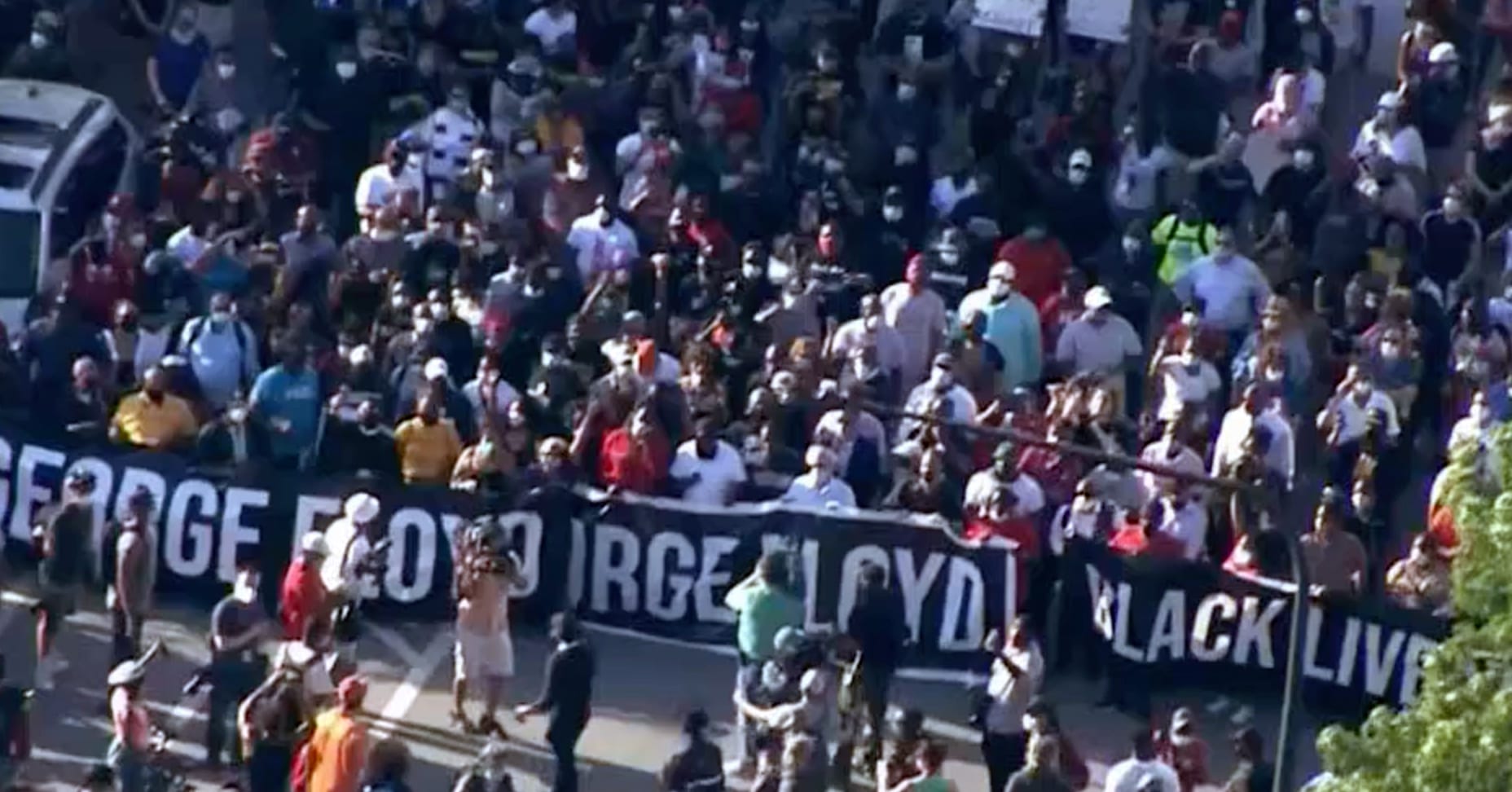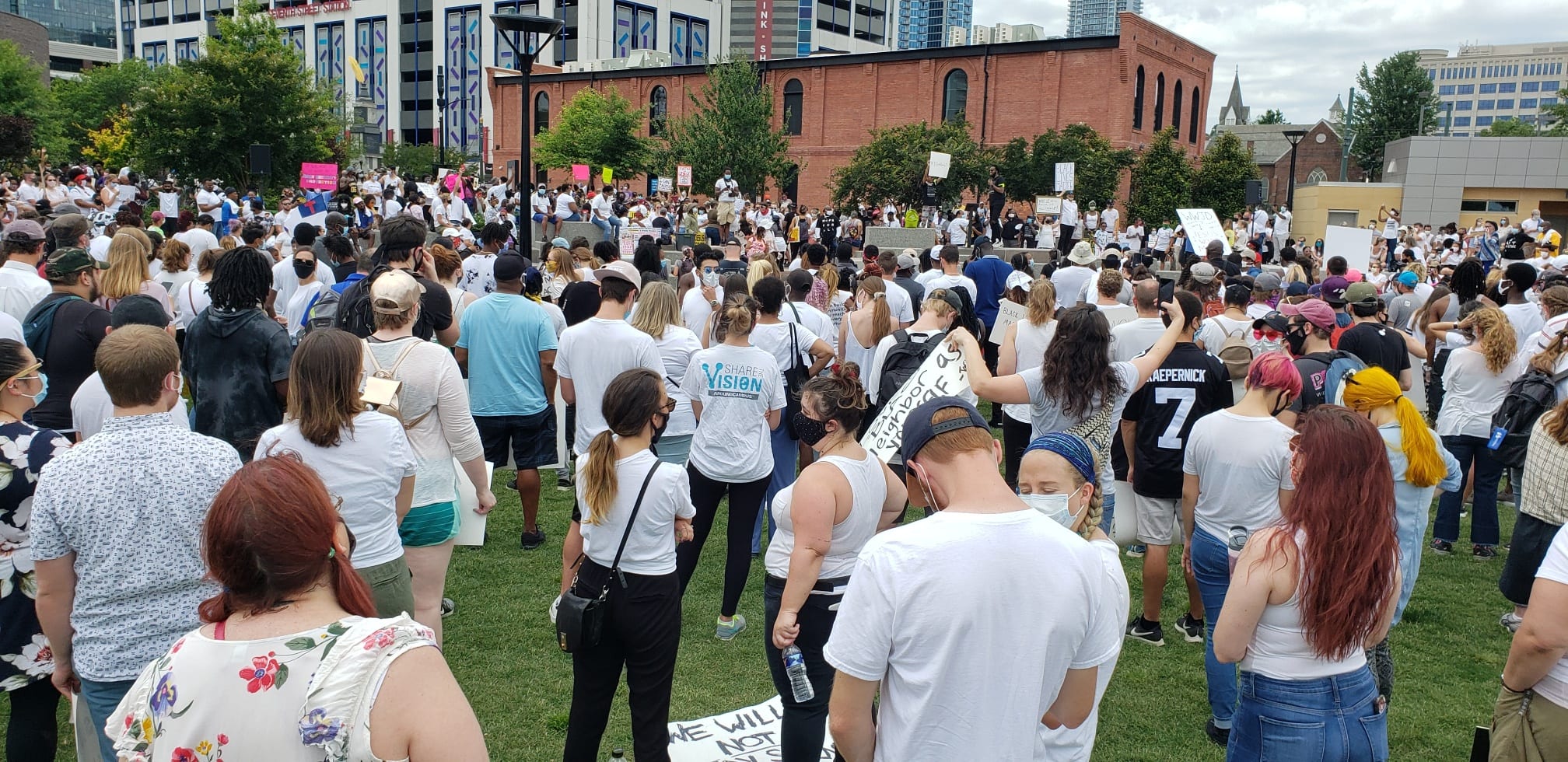
At least two Chicago Southern Baptist congregations joined a diversity of faith leaders June 2 in a peaceful march and protest in a historic Southside neighborhood. They called for change and justice after the killing of a black man, George Floyd, in police custody.
They gathered in Chicago’s historic Bronzeville neighborhood at the Great Northern Migration Monument, which was erected to honor the African American diaspora from the Jim Crow South of the 20th century.
Pastors and rabbis led throngs June 2 in a peaceful march that stretched nearly 30 blocks, crying out for justice for George Floyd and an end to historical injustice against blacks.
Among the marchers and protesters were Southern Baptist researcher and missiologist Ed Stetzer, Progressive Baptist Church of Chicago members and Senior Pastor Charlie Dates, and members of Hillcrest Baptist Church in suburban Country Club Hills. Police escorted the crowd.
“We’re just adding our support and are sending our people because the challenge in Chicago, as it is around the nation, is that peaceful protests have been overtaken by rioters and looters,” Dates said in advance of the event. “Our goal is just to help those who are planning a peaceful protest.”
Floyd’s death in police custody May 25 has led to the firing of four policemen and criminal charges against each. Charges against Derek Chauvin were upgraded Wednesday, when three other officers involved in Floyd’s case were arrested. Chauvin now faces charges of felony second-degree murder and manslaughter. Former officers Thomas Lane, J. Alexander Kueng and Tou Thao are charged with aiding and abetting Chauvin in the death.
“American history is a symphony of carnage, it is an orchestra of murder, and it is the thievery of breath from black America,” Dates said. “So the statement ‘I can’t breathe,’ is theological before it is anthropological.”
Stetzer attended at the invitation of friends Dates and James Meeks, pastor of Salem Baptist Church in Chicago, a non-Southern Baptist congregation.
“As a follower of Jesus, my fellow pastors asked me to come and engage with them in their pain and to stand with them in their plea. How could I not go?” Stetzer emailed Baptist Press. “If one part of the body of Christ suffers, all do. We are never more like Jesus than when we stand beside those who are hurting.”
Peaceful protests in large and small cities across the nation have turned to riots, looting and arrests. Event organizers said they wanted to demonstrate the worth of peaceable demonstrations.
Hillcrest pastor Adron Robinson, a member of the Southern Baptist Convention (SBC) Executive Committee, was out of town during the Chicago march, but encouraged members of his congregation to participate.
“The murder of George Floyd has once again revealed the hatred in the hearts of many Americans; but we cannot respond to hate with more hate, this will only destroy us all,” Robinson said. “So we marched to demonstrate how to respond with love, wisdom and a plan to address these injustices going forward. Only God’s love can conquer hate; so the church has to incarnate the love of God into the pain of our communities.”
Stetzer encouraged Southern Baptist pastors to study the plight of the oppressed African American community.
“I’d encourage all pastors to educate themselves more about the inequalities experienced in communities of color, to know the history and the current challenges that still remain,” Stetzer said. “When you do, you will understand more why people protest.”
Joining in the cause is “an amazing gospel opportunity to stand for what you once stood against because you’ve been changed by the power of the gospel,” Stetzer said, referencing the SBC’s beginnings as a pro-slavery denomination. “I think the Lord would be honored if Southern Baptists saw their unique responsibility to keep working for justice and race relations.”
At Progressive Baptist, about 80% of an average Sunday attendance of 800 are black, Dates said. Floyd’s death and the added turmoil of the day have been difficult psychologically for the church’s members.
“This is a pro-life issue. Any time you see police who do not respect the dignity of a woman or a man made in the image of God, it’s that kind of issue,” Dates said. “So I think we’re handling it psychologically by holding onto our theological convictions, that even the people who hate us, even the police who do us wrong, they themselves are made in the image and likeness of God.
“So the very people who hate us, we cannot hate them. I think even our psychological standing has to be informed by our biblical theology. And so we march, so we do something as a result of all of this. We don’t just sit on the sidelines and watch black women and black men get killed and mouth irrelevant pieties from the pulpit.”
Robinson said peaceful interactions are more productive than violence.
“We encouraged our church to participate because we wanted to show our neighbors that the church cares about our community, we care about injustice, and we care about police brutality,” Robinson said. “And because we care, we joined them in their pain and anguish, because as a part of the community, we share those same feelings. But we also offered them a better way to address their pain, by peaceful and purposeful protest instead of violence and chaos.”
Dates would like other Southern Baptist pastors to advocate for justice.
“Even the announcement of the coming of Christ in Isaiah 9, the enthronement, the establishment of the Kingdom of God, is done in the language of justice and righteousness,” Dates said. “The church, in having received her Messiah and awaiting His return, has to operate in those things. The state does not, but the church has to.”
Bright Star Church of God in Christ, pastored by Chris Harris, was a main organizer of the event in memory of “George Floyd and countless other African Americans who have died as a result of police brutality, systemic racism and injustice,” Harris wrote at brightstarchurchchicago.com. News reports put the crowd between “hundreds” and “thousands.”
(EDITOR’S NOTE – Diana Chandler is Baptist Press’ general assignment writer/editor.)

